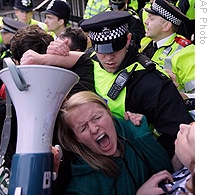London
23 October 2009
 |
| Demonstrators in London protest TV appearance by Nick Griffin |
The decision to invite Griffin to appear on the program was controversial from the start. Griffin and the BNP hold extremist views on immigration and race. The party's constitution bans non-whites from being members.
Much of the debate about the BBC program was on the BBC itself. Before the TV program was broadcast, former London Mayor Ken Livingstone told BBC radio the corporation was wrong. "It seems to me the BBC has lost the moral compass?in the last year we've had the decision the BBC wouldn't broadcast the conference against climate change because they thought it was too partisan, wouldn't have an appeal for the fund for the victims in Gaza, but is quite prepared to give Nick Griffin prime time TV," he said.
On the same program, the BBC's Deputy Director General Mark Byford defended the decision. "The BBC's job is to secure due impartiality and in securing due impartiality on what is a premiere political discussion program, it is right in our belief that the BNP should have an appearance," he said.
Byford said because the BNP had garnered a million votes in the European Parliament elections, about the same support as the environmental Green Party, its leader was invited on the broadcaster's premiere political program, Question Time. "It is for the BBC, knowing that the party was allowed to stand in the European elections and other elections, then to judge their level of support, to then say, it is therefore fair for them to have a place on Question Time to be challenged along side other political parties as well. And for the public to hear their views and for the public to make up their own minds," he said.
Gideon Rachman, a chief commentator for London's "Financial Times" newspaper says the decision made sense. "I think it was an upholding of the basic principles of freedom of speech. After all it's very easy to defend the rights for people to speak who you agree with. The point is to defend the rights of people you don't agree with. That's the idea of a democracy, that all opinions are heard," he said.
As Nick Griffin arrived at the studios for the show, protesters had to be held back. Some anti-fascist demonstrators had earlier broken through the BBC security barriers.
On the program itself, Griffin was constantly challenged, as in this exchange, where he tries to explain his stance on immigration.
NICK GRIFFIN: "The government's own figures, according to demographers at Oxford University, show that the indigenous British the people who've been here... "
JACK STRAW: "The whites, the whites"
NICK GRIFFIN: "Skin color's irrelevant Jack, skin color's irrelevant."
JACK STRAW: "what do you mean by whiteness, indigenous"
OTHER PANELIST: "Why are you against mixed marriage"
HOST DAVID DIMBLEBY: "Wait wait, if you all attack on different fronts we'll get nowhere."
A main criticism of Griffin and the BNP , is that it's predjudiced against non-whites. On the program, Griffin tried to distance himself from that stance.
NICK GRIFFIN: "The indigenous people of these islands, the English, the Scots the Irish and the Welsh"
JACK STRAW: "The whites"
NICK GRIFFIN: "The color is irrelevant it's the people who have been here overwhelmingly for the last 17,000 years, we are the aborigines here."
The BNP is unhappy with the way the program was run, says John Walker, the party's spokesman. "There were so many issues that they should have been discussing. It wasn't a normal question time, it was let's have a go at Nick Griffin time," he said.
Kelvin MacKenzie, a former newspaper editor and commentator says the show had to be about Griffin. "This was a first and therefore you had to deal with his absurd and vile policies and the analysis of them had to take a long time and you had to get right down deep into him and how he thought," he said.
The BNP leader himself plans to launch a formal complaint about the program. "The British public, millions of extra people that tuned in last night, are aghast by the display of bias from the BBC, the venom from the political class, and the sheer unfairness. That was not a genuine Question Time, that was a lynch mob," he said,
One commentator called the appearance the biggest TV event since David Frost interviewed Richard Nixon in 1977. Whether it has done anything to help or hinder the right wing BNP party won't be clear until the next round of British public opinion polls or until Britain's next country-wide election, expected in 2010.